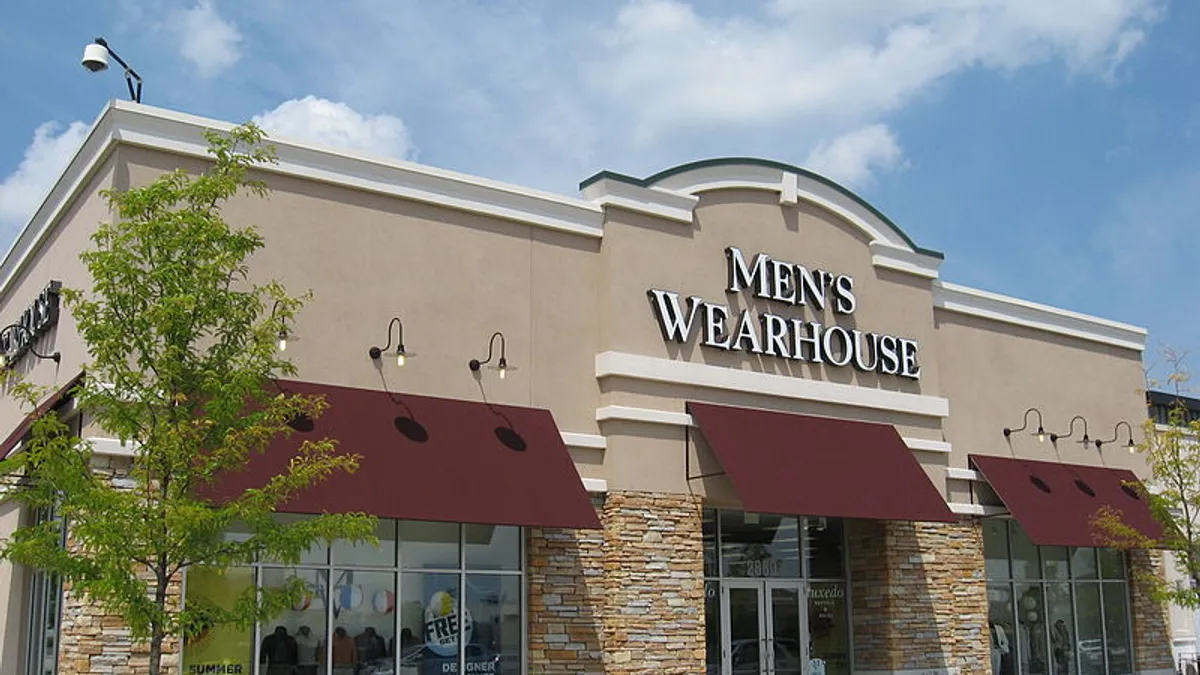Dive Brief:
- Tailored Brands filed for Chapter 11 bankruptcy on Sunday with the U.S. Bankruptcy Court for the Southern District of Texas, according to a company press release. The company plans to reduce corporate staff, the number of retail locations, and its supply chain infrastructure as part of its go-forward plan.
- The retailer, which owns Men's Wearhouse, Jos. A. Bank, Moores Clothing for Men and K&G, has entered into a restructuring agreement supported by over 75% of its senior lenders. The pre-arranged plan is expected to reduce the retailer's debt by $630 million.
- The retailer has secured $500 million in debtor-in-possession financing from existing lenders and expects to continue to operate stores through the bankruptcy process.
Dive Insight:
Tailored Brands has been warning of a potential bankruptcy for months now.
In early June, the company said in a securities filing that it may have to terminate operations or seek bankruptcy protection, pointing to a dramatic sales decline of over 60% due to the COVID-19 pandemic. The summer progressed with other warning signs — a Bloomberg report citing anonymous sources said the company was working with law firm Kirkland and Ellis, a law firm that has guided many prominent retail companies through the bankruptcy process. Then Men's Wearhouse missed a $6.1 million interest payment on bonds in early July. Weeks later the company identified around 500 retail locations for permanent closure, said it would eliminate 20% of corporate positions by the end of the second quarter, and announced the exit of its CFO.
Yet, troubles with the company did not begin with the onset of a global health crisis. Revenue had declined by around 5.6% over the past two years, with the company pointing to "the continuing decline in the brick-and-mortar retail industry generally" as a reason for its stumble, according to court documents. In what could be seen as an early indicator in what was to come, the retailer sold off its Joseph Abboud trademarks in January to brand management firm WHP Global for $115 million, in part to pay down debt.
The company was founded in 1973 with the opening of the first Men's Wearhouse store in Houston by George Zimmer, who became the face of the company with his famous "I guarantee it" ad campaign, but ousted him as CEO in 2013 amid changes in apparel consumption and the casualization of the workspace. The retailer points back to the '90s as a time of declining demand for tailored clothing, though by the end of that decade it would exceed $1 billion in revenue for the first time.
The company responded by diversifying its assortment to include more sport coats and slacks and expanding to include formal wear, an effort to reach out to younger clientele, through a 2007 acquisition of more than 500 Afterhours Formalwear and Mr. Tux rental stores that were converted to Men's Wearhouse locations. It also fought hard to acquire Jos. A Bank in 2015, a move that Zimmer was on the record as opposing.
When the pandemic hit, though, work clothing and occasion apparel were essentially put on pause as the United States was placed on lockdown. An entire swath of the workforce across industries was suddenly working from home and events were canceled or delayed, deeply impacting apparel sales.
Going forward the company wants to emerge with a "viable and feasible business" that preserves around 15,500 jobs, according to Chief Restructuring Officer Holly Etlin, a managing director at financial advisory firm AlixPartners. The company has around 18,000 employees and operates nearly 1,280 stores in the United States and 125 stores in Canada.
















